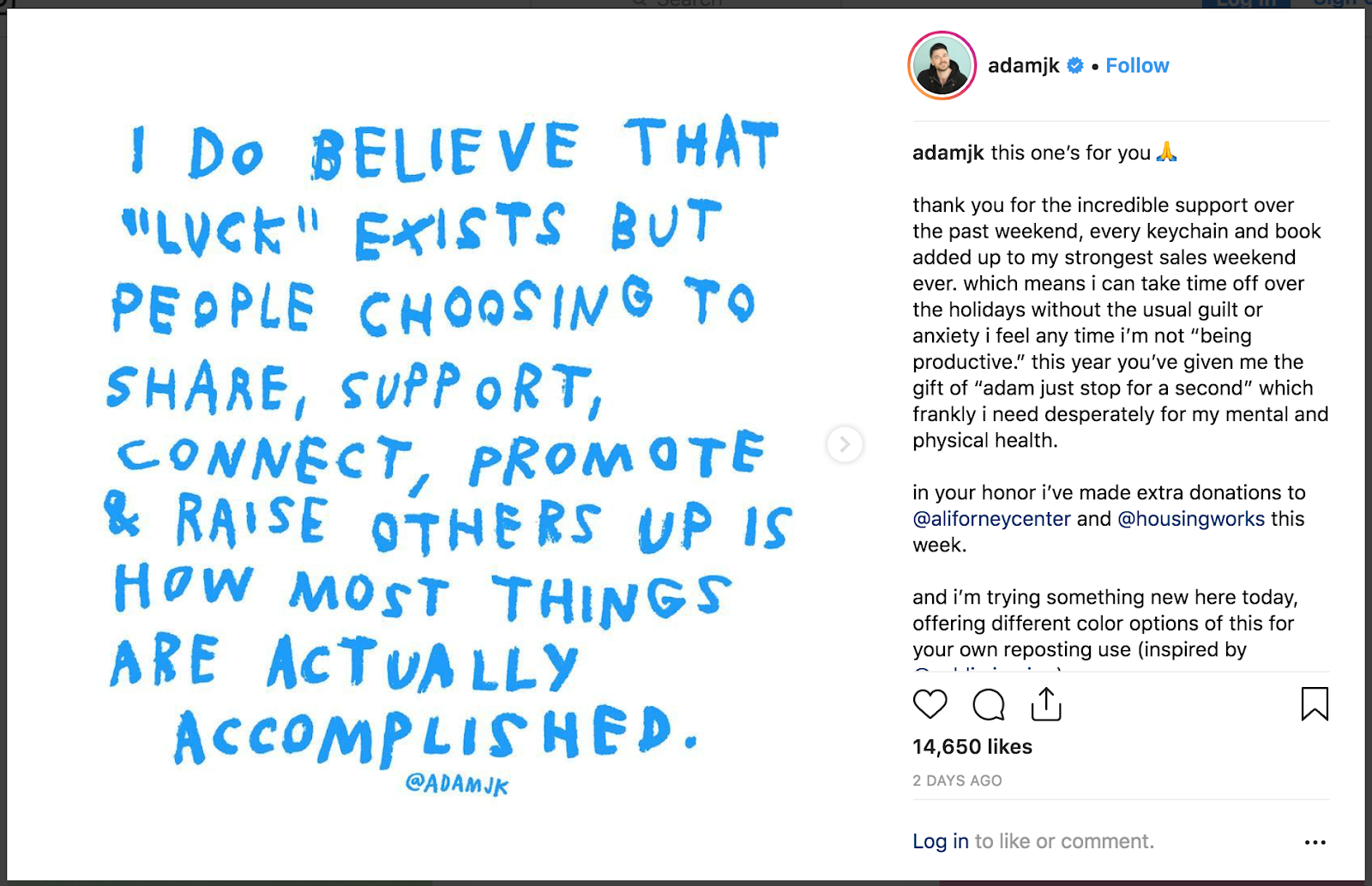Many high-profile people believe luck gave them a major edge.
Instagram co-founder Kevin Systrom says luck was responsible for at least 50% of his success. So does music mogul L.A. Reid. Even Reid Hoffman of LinkedIn agrees.
As top industry players, it’s natural to see their journeys as blueprints for achievement.
Our culture is also obsessed with exploring the impact of luck on success. If we can prove that luck matters deeply, it means we can wait for it to find us. If we fail, then we can say we just weren’t lucky enough.
So, we ask every entrepreneur or expert how much luck inspired their accomplishments, then we silently calculate how to engineer the same circumstances.
Models, experiments, and luck simulations have also tried to clarify the issue. Some claim that you need to believe you’re lucky in order to attract more, or that luck is a skill you can learn.
Take for example the research of Dr. Richard Wiseman, which found that people who self-identified as lucky are more likely to find money on the street or take advantage of the ‘luck’ they see before them.
But as a founder who, like many other entrepreneurs, has received my fair share of fateful moments, I find that focusing on ‘luck’ has the opposite effect.
If we look at luck through a macro lens, we can’t ignore what Warren Buffet calls the ovarian lottery — the circumstances we’re born into that affect our opportunities.
But if we consider the luck of a moment, such as meeting someone important, stumbling upon crucial information, or having an idea at the ‘right’ time, I look at the issue differently.
I believe something else happens in those ‘lucky’ moments. Luck may put us in a better position, but we still need skills, dedication, and awareness to capitalize on them.
So when I find myself in these timely moments, I don’t think about how lucky I am; I focus on what to do next.
The world may run on luck, but we shouldn’t
Luck can become a crutch that distracts you from your daily goals or, worse, an unnecessary complication that feeds on anxiety.
It’s self-preservation: if we give luck half of the responsibility, we don’t have to blame ourselves if we don’t succeed.
Entrepreneur Kendra Scott, who built a billion-dollar jewelry and lifestyle brand from just $500, refuses to believe that luck has played any role in her success:
“There’s no luck” Scott told NPR. “I don’t really believe in luck. This has been very hard. There were a lot of days I didn’t think that I would keep this business. I think part of it is drive, and I saw where we needed to go. Giving up was not an option.”
While we don’t have to discredit luck altogether, we shouldn’t diminish the hard work it takes to build a company — especially when that attitude helps us to improve and stay motivated.
When we look at our lives and careers in the rearview mirror, it’s easy to see how luck connected the dots. And, ultimately, that’s what successful entrepreneurs do when they talk about luck.
But luck didn’t make them wake up early every morning, for example, and work on their product before heading to a day job.
Cliches like ‘right place, right time’ are often used to rationalize why some products succeed over thousands of others.
But, as Seth Goldman, founder of Honest Tea believes, those justifications undercut everything that brought you to that “ideal” moment:
“…well you know, it took ten years to get to that right place, so this wasn’t something that just happened overnight.”
Goldman says his success relied less on luck and more on persistence, which is a far more inspiring and active way to pursue our goals.
Luck isn’t an edge. It’s not what pushes you to think critically, stretch your creativity, or stay up all night to finish a project. It’s something to leverage, not to anticipate.
Finesse over fortune
Some experts suggest that you can develop skills for generating more luck. I like to think it’s more about applying the right tactics.
For example, you’re facing an open door. If you focus on luck, you might waste time questioning if the door is open or why. Before long it might close altogether.
You might also worry about “lucky streaks,” what conditions generate them, and how to recreate lucky situations from the past.
Ultimately, we take a passive role if we define these moments as luck. We forget to act, and then we exhaust a potentially fortuitous opportunity.
Now, let’s put tactics before luck. Finesse over fortune. Rather than teaching ourselves how to be lucky, we can learn how to get the most from each opportunity — good or bad.
Systrom believes that the world runs on luck, but we have to turn those lucky breaks into success. Otherwise we’re applying the wrong formula.
“Everyone gets lucky for some amount in their life and the question is: are you alert enough to know that you’re becoming lucky?” says Systrom. “Are you talented enough to take that advantage and run with it? And do you have enough grit; do you have enough resilience to stay with it when it gets hard?”
Beyond just “grinding” to succeed, there’s more we can take from his advice:
Take advantage of small moments of luck. Use them to persevere through hardships: when your servers are barely keeping the product online or people don’t think your solution is a viable option — yet.
Don’t undercut your product
There’s one other downside to giving luck all the credit: we end up belittling the hard work that goes into success — much of which probably isn’t our own.
In my case, our team of 130 employees has enabled me to build Jotform into a global company. While I’m lucky to work with a brilliant group of people, successful team building, thoughtful hiring, and a supportive culture have also made a big difference.
Adam J. Kurtz has built a recognizable brand from his design and writing. His methodology doesn’t leave space for the 50/50 rule of luck.
When we give luck 50% of the credit, we shortchange our products, our teams, and even ourselves.
Everyday luck, like the kind that Systrom spoke about earlier, could be a small moment of good fortune, like finding money on the street. But products don’t achieve market fit because you spied some extra cash.
As real estate entrepreneur Barbara Corcoran says,
“Luck is a byproduct of hard work & good judgement.”
Corcoran’s quote suggests that luck is the aftermath of action. When we put in the work, we actively expose ourselves to new opportunities.
Celebrated chef and entrepreneur Jose Andres understands the power of forward momentum, and applied this principle while building his career.
“I think luck only happens when you are actively moving and searching for what is next,” Andres told NPR. “Start moving. Look for the horizon.”
Arriving in the United States with only $50 in his pocket, you could say Andres got lucky. Or you could examine his body of work, see how he leveraged opportunities, and realize that luck was just a serendipitous off-shoot.
Luck or not, let’s put our work first
Good fortune will probably play some part in your success. But you don’t have to worry about how much.
Don’t get sucked into the cult of the guru or attempt to design your own luck. Remember that we’re all working with unique personal circumstances, and there is no surefire formula.
By obsessing over luck, we waste time trying to recreate a perfect situation, instead of creating something new from our fresh hand of cards.
And we need those precious work hours to build products, manage companies, and grow our businesses.
So, for now, I’m going to forget about luck and get back to work.















Send Comment:
2 Comments:
More than a year ago
Relative Success ( Comparison amongst your peers who started at the same level) - That can be achieved by hardwork, grit & foresight.
Absolute Success ( measured against humanity) - Luck is critical. Cause your ability to be in the long tail of a distribution curve means lesser probability of that event happening. Ergo means luck plays a larger role. Cause wild successes are so rare.
Take for instance, Earth. After all our searching, our calculated mind tells us of billions of planets with Life. Have we found one ? No..Our hubris refuses to accept the fact the earth is super unique in the universe. A random combination of events that made is 'just perfect' to get humanity.
So successful people like the CEO writing this article, thinks all of his handwork created his successes. Believe me, if you were born in some Third world, to poor parents, your life would have take a whole different trajectory. I am personally a witness to so many talents wasted cause they were unlucky. Accept the role of luck, be humble & give back to society if you got a lot more than you actually need. Cheers.
More than a year ago
Have you considered the fact that all the other factors that make success - the skills, the dedication, perseverance, tactics etc, etc are also a product of luck?
This article explains this a bit more..